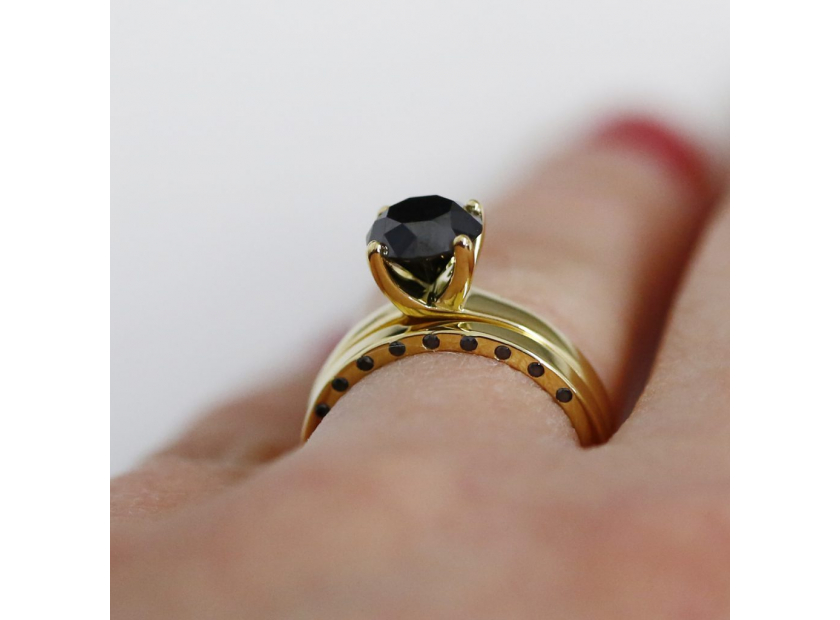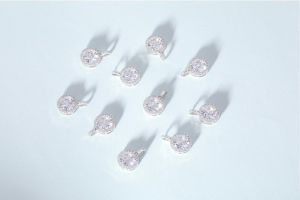USD
/
USD
/
Shipping to:
Currency:
The Five Most Asked Questions About Black Diamonds
Posted:
December 27, 2017
4 min read
Black diamonds are captivating and unique, standing out from traditional white diamonds with their rich, deep color. Often associated with mystery and sophistication, black diamonds have gained popularity in recent years, especially in alternative and avant-garde jewelry designs. Whether you're considering a black diamond for an engagement ring or simply intrigued by its allure, it's essential to understand what sets these gems apart. Here, we delve into the five most frequently asked questions about black diamonds, offering detailed insights to help you appreciate their beauty and significance fully.
What Makes Black Diamonds Unique?
Black diamonds are distinct from other diamonds due to their unique color, which results from the presence of numerous inclusions or clusters of graphite within the stone. These inclusions, rather than detracting from the diamond's value, create the opaque and strikingly dark appearance that black diamonds are known for. Unlike other diamonds that sparkle with internal reflections, black diamonds absorb light, giving them an entirely different kind of beauty. Their rarity and the enigmatic quality of their appearance make black diamonds a popular choice for those seeking something unconventional in their jewelry.
Are Black Diamonds Real Diamonds?
Yes, black diamonds are indeed real diamonds. They are composed of the same carbon crystal structure as traditional white diamonds but are colored by the high number of inclusions or the presence of graphite. These diamonds can be natural or treated, with natural black diamonds being rarer and often more valuable. It's important to note that the treated black diamonds start as low-quality colorless or near-colorless diamonds, which are then subjected to high temperatures or irradiation to achieve the desired black color.
How Do Black Diamonds Compare in Value to White Diamonds?
When it comes to value, black diamonds can vary significantly depending on whether they are natural or treated. Natural black diamonds are rarer and can command higher prices, especially if they are of significant size and quality. However, treated black diamonds are more affordable, making them accessible to a broader range of buyers. Unlike white diamonds, where clarity, color, and cut significantly impact value, black diamonds are primarily valued for their size and the uniformity of their color. The market for black diamonds is also influenced by trends in fashion and jewelry design, with their popularity often driving demand.
Can Black Diamonds Be Used in Engagement Rings?
Black diamonds have become an increasingly popular choice for engagement rings, particularly among those who desire a non-traditional look. Their bold color provides a striking contrast against white metal settings, such as platinum or white gold, and can be paired beautifully with white diamonds or other gemstones. While they are as hard and durable as white diamonds, it's important to note that black diamonds can be more brittle due to the inclusions that give them their color. This means they may require more careful handling and protection against sharp impacts.
What Should I Consider When Buying a Black Diamond?
When purchasing a black diamond, consider whether you prefer a natural or treated stone. Natural black diamonds are rarer and come with a higher price tag, while treated diamonds offer a more budget-friendly option. It's also essential to assess the diamond's overall appearance, ensuring that the color is evenly distributed and that the stone has a smooth surface without visible cracks or pits. Certification from a reputable gemological laboratory can provide assurance of the diamond's authenticity and quality. Additionally, consider the setting and design of the jewelry, as black diamonds pair well with various metals and complementary gemstones.
FAQs About Black Diamonds
Can black diamonds be scratched? While black diamonds are extremely hard, just like white diamonds, they can still be scratched by materials of equal or greater hardness, such as other diamonds. However, due to their structure, black diamonds are slightly more prone to chipping or fracturing if subjected to rough handling.
Do black diamonds sparkle like white diamonds? Black diamonds do not exhibit the same kind of sparkle as white diamonds because they absorb light rather than refract it. Instead, they have a unique, subdued shine that adds to their mysterious and dramatic appeal.
Are black diamonds suitable for daily wear? Yes, black diamonds are durable enough for daily wear, but they should be set in protective settings to minimize the risk of damage. It's also advisable to remove black diamond jewelry during activities that may subject them to hard impacts.
How can I tell if a black diamond is natural or treated? Distinguishing between natural and treated black diamonds usually requires a professional evaluation, as the differences may not be visible to the naked eye. A certification from a gemological laboratory can provide information about the diamond's origin.
What is the best way to clean black diamond jewelry? Black diamond jewelry can be cleaned using a mild soap and water solution, gently scrubbing with a soft brush. It's best to avoid harsh chemicals or ultrasonic cleaners, as these can potentially damage the diamond or its setting.








